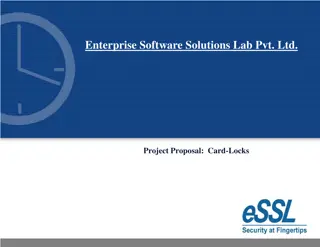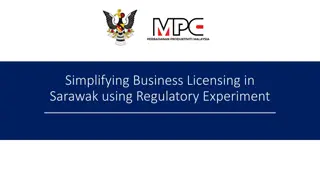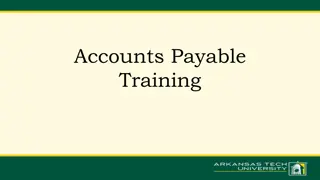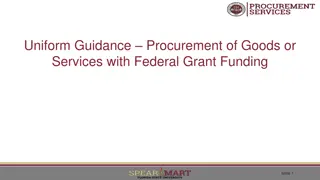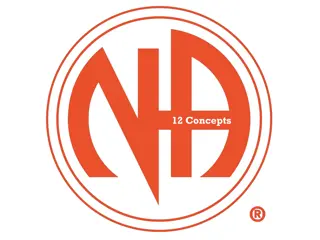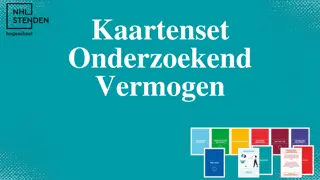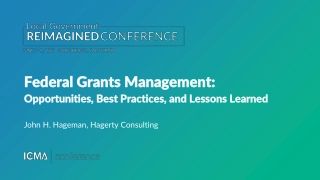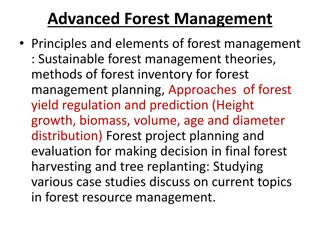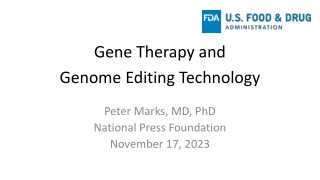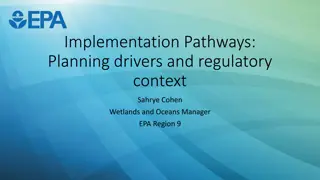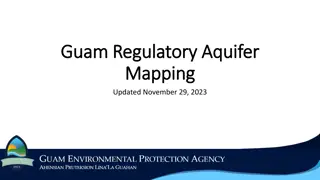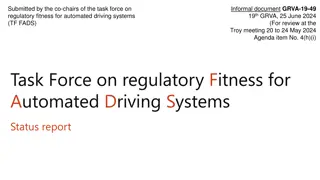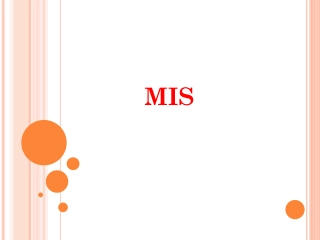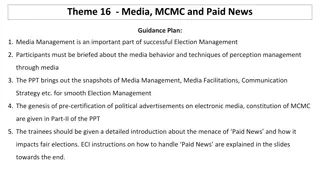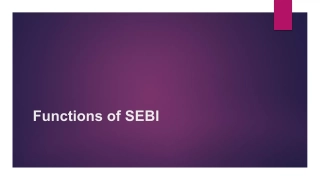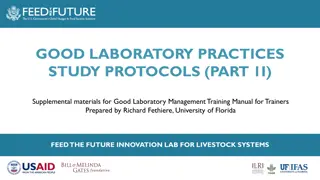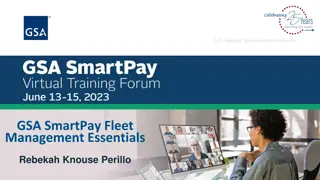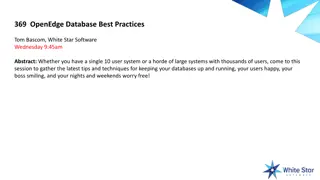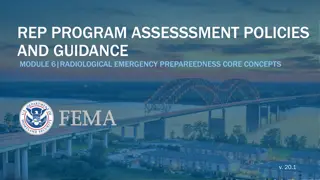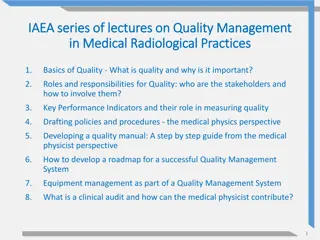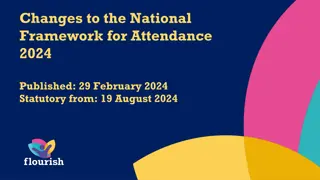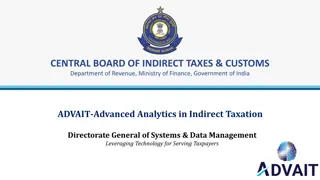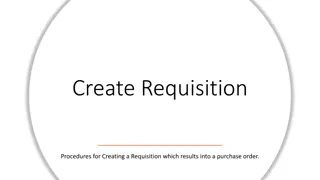Advanced Concepts in Purchase Card Management - Regulatory Guidance and Best Practices
Explore the regulatory guidance, policies, and best practices for managing purchase card programs effectively. Learn about micropurchase thresholds, FAR regulations, penalties for violations, and how to innovate and elevate your purchase card program. Ensure compliance, internal controls, and safeguarding procedures are in place to prevent erroneous transactions.
Download Presentation
Please find below an Image/Link to download the presentation.
The content on the website is provided AS IS for your information and personal use only. It may not be sold, licensed, or shared on other websites without obtaining consent from the author. Download presentation by click this link. If you encounter any issues during the download, it is possible that the publisher has removed the file from their server.
Presentation Transcript
U.S. General Services Administration Advanced Concepts in Purchase Card Management Joline McDonald
Learning Objectives Purchase Card Program Regulatory Guidance and Policies Agency/Organization Best Practices for Managing the Purchase Card Program Purchase Card Program Innovation: How to Take your Purchase Card Program to the Next Level Resources and Questions
Purchase Card Regulations and Policy Micropurchase Thresholds Federal Acquisition Regulation (FAR) Public Law 112-194 OMB Circular A-123 Appendix B
Purchase Card Regulations and Policy FAR Subpart 2.101 Micro-purchase Thresholds (MPT) and Guidance
Purchase Card Regulations and Policy FAR Subpart 13.201(b) states that the Governmentwide commercial purchase card shall be the preferred method to purchase and pay for micro-purchases FAR Subpart 13.301 discusses the Governmentwide commercial purchase card: Agencies should encourage card use by contracting officers to place orders against contracts established under FAR Part 8 procedures Agencies should also encourage placement of orders/make payments under other contractual instruments
Purchase Card Regulations and Policy Public Law 112-194 Management of Purchase Cards Required Safeguards and Internal Controls that include procedures for: Record maintenance of purchase cardholders, including single transaction or overall purchase limits Reconciliation, certification, and record retention requirements are outlined for purchase cardholders Review/ data mining requirements to identify and prevent erroneous and improper/illegal purchases Refund validation and training requirements
Purchase Card Regulations and Policy Public Law 112-194 Management of Purchase Cards Penalties for Violations that include: Appropriate punishment for adverse personnel action such as violation of agency policy or illegal, improper, or erroneous purchases Employee dismissal procedures Semiannual Report On Violations requirements for agencies with more than $10 million in annual purchase card spend provided to the Office of Management and Budget (OMB) by the agency Inspector General
Purchase Card Regulations and Policy Public Law 112-194 Management of Purchase Cards Risk Assessments and Audits: Requires agency Inspector Generals (IGs) to conduct periodic reviews of purchase card programs and identify/analyze potential risks Requires IGs to look for spend patterns and ways to leverage agency expenditures Requires IGs to report findings and any implementation of updated procedures back the head of the agency and OMB
Purchase Card Regulations and Policy OMB Circular A-123 Appendix B provides agencies with a framework to best manage their charge card programs. The Circular provides guidance in alignment with Public Law 112-194 and covers various card program management topics such as: Internal Controls Training Performance Metrics and Reporting Refund Management 2
Purchase Card Regulations and Policy OMB Circular Purchase Card Internal Controls: Application Process applications, delegation of authority, training Transaction Process disputes and improper transactions Review and Approval Process reconciliation, documentation, approvals Charge Card Management Process separation of duties, delinquencies, span of control, invoicing approvals and payments
Purchase Card Regulations and Policy OMB Circular Purchase Card Training: Who is required to take training? Cardholders, card managers, AOPCs, Approving Officials How often? A minimum of every three years (though some agencies require more frequent training) AOPC Training should encompass an understanding of cardholder and AO functions, card management functions, as well as training on the Electronic Access System, data analytics tools, and reporting
Purchase Card Regulations and Policy OMB Circular Purchase Card Performance Metrics and Reporting: Annual Statistical Reporting GSA Center for Charge Card Management (CCCM) maintains on behalf of the agencies Includes items such as number purchase accounts and total purchase spend Annual Narrative Reporting CCCM maintains on behalf of the agencies Includes items such as descriptions of agency s best practices and information on delinquency monitoring practices
Purchase Card Regulations and Policy OMB Circular Purchase Card Refund Management: Agencies should take steps to maximize refunds, to include ensuring on- time payments Agencies must review refund agreements annually, prior to option extension, and prior to task order recompete Agencies should leverage tools to assist in refund validation processes such as: Contractor provided refund review guides Quarterly refund reports Refund review tools GSA SmartPay data warehouse dashboard
Purchase Card Management Best Practices Policy Development and Considerations Maximize use of reports and bank or brand tools Leverage purchasing power using strategic solutions that permit the use of charge cards as ordering and payment solutions Institute internal management controls to mitigate risk of misuse and/or delinquency Initiate administrative or disciplinary actions for card misuse, abuse, and repeated account delinquency Learn from others by reviewing audit reports and findings (https://smartpay.gsa.gov/content/audit-repository)
Purchase Card Management Best Practices Policy Development and Considerations Mitigating Risks with Internal Controls: Assignment of Duties Separated by Individual Appointment Process for Cardholders and Approving Officials Span of Control Transaction Approval Process Reconciliation Controls Delinquency Controls
Purchase Card Management Best Practices Policy Example #1: Section 889: Prohibition on Certain Telecommunications and Video Surveillance Services or Equipment Part of the FY19 NDAA Contains Part A and Part B: Part A prohibits the government from obtaining certain telecommunications equipment or services produced by certain covered entities, their subsidiaries, and affiliates Applicable to commercial items and micro-purchases Part B prohibits the government from contracting with any entity that uses certain telecommunications equipment or services produced by the entities listed in the statute Applicable to every sector and every dollar value when entering into contracts
Purchase Card Management Best Practices Policy Example #1: Section 889: Prohibition on Certain Telecommunications and Video Surveillance Services or Equipment Purchase card policy considerations: Leveraging existing Federal Contracts/Ordering Sites Written Representation Implications Managing Risk Utilization of reporting tools Training updates Section 889 Search Tool
Purchase Card Management Best Practices Policy Example #1: Section 889: Prohibition on Certain Telecommunications and Video Surveillance Services or Equipment Easy to use search tool for users Search by business name, website, CAGE code, or SAM.gov Unique Entity ID Search provides a PDF if registered in SAM.gov
Purchase Card Management Best Practices Policy Examples Policy Example #2: Training Purchases Pub. L. 85-507, The Government Employees Training Act (GETA) (1958), gives each federal agency general authority for employee training FAR based training versus non-FAR based training Micropurchase Thresholds Types of Training Purchases: Individual Training for an existing course Existing commercial off the shelf training Tailored Training Subscriptions for training access
Purchase Card Management Best Practices Policy Examples Has your agency determined training is not a FAR-based action? Approved on an SF182, Authorization, Agreement, and Certification of Training (or agency equivalent) Training is allowable under GETA Procurement mechanism on the open market, Ordering mechanism against an existing contract, or Payment only mechanism for training procured by other means How is the purchase card being used? Individual slot in an existing course, Existing commercial off-the-shelf course to be imported, Tailored training, or Subscriptions for training access What type of training is being purchased? 2
Purchase Card Management Best Practices Policy Examples Regularly scheduled, commercial off-the-shelf courses, training conference, or instruction (not tailored), Available to the general public, and Priced the same for everyone in the same category (e.g., price per student, course, program, service, or space). Government or Non- Government Sources? Creating a new training course Existing course tailored specific to agency mission, regulations, policies, etc. When it requires a Statement of Work (SOW), considered a FAR- based action subject to the appropriate MPT for services ($2,500 nonprofessional / $10,000 professional) Is the Training Tailored? Human resources Employee training and development Procurement Agency Policies Related to Training? 2
Purchase Card Management Best Practices Policy Considerations Policy Example #3: Long Term Rental or Lease of Land or Buildings Long-term rental agreements or leases extend BEYOND a 12-month period and are intended for more than a temporary basis The GSA SmartPay 3 Master Contract requires the Contractor banks to be able to further restrict purchase cards for long-term rental and lease of land or buildings Agencies can only use the purchase card as a payment mechanism in accordance with the cardholder s authorized purchase limits and authority
Purchase Card Management Best Practices Policy Considerations Policy Example #4: Conference Space Purchases Conference space is considered a short term rental or lease agreement, meaning the agreement is in place for LESS than 12 months Agencies can utilize the purchase card as a purchase and/or payment mechanism for the acquisition of conference space (when a travel CBA is not appropriate) This may include examples such as procuring a group of training rooms within a hotel for a three-day agency training session Always consider your agency s specific policies before determining whether to utilize a purchase card for conference space
Purchase Card Management Best Practices Policy Considerations Policy Example #5: Toll Payments Agency policy dictates if purchase cards can be used to secure toll pass accounts that require a card on file to charge per toll or replenish funds for tolls. Accounts must be in the name of the agency, not a person. Toll passes, transponders, and vouchers are considered cash equivalents and must be secured as such Consideration must be given to the Advance Payment statute (31 USC 3324) payment cannot exceed the value of the service / good
Purchase Card Management Best Practices Policy Considerations Policy Example #6: Parking Passes and Fees Agency policy dictates if purchase cards can be used to secure parking pass accounts that require a card on file to charge a recurring (e.g. monthly) fee for parking services Agency policy Accounts must be in the name of the agency, not a person Agency consideration must be given to the Advance Payment statute (31 USC 3324) payment cannot exceed the value of the service / good
Purchase Card Management Best Practices Policy Considerations Policy Example #7: Subway Tokens and Metro Fare Cards The purchase card can be utilized to purchase subway tokens, tickets, and metro fare cards when employees commute across large metropolitan areas for normal job duties (e.g. attend meetings) Accounts must be in the name of the agency, not a person These items are considered cash equivalents and should be secured as such in accordance with agency policies and procedures
Purchase Card Management Best Practices Policy Considerations Policy Example #8: Third Party Payment Processors Third Party Payment processors (e.g., PayPal, Square, etc.) offer e- commerce/internet payment solutions for commercial transactions. Merchants can utilize them without establishing a merchant account Transactions made through third party payment processors are considered high risk (doesn t include known processors) Guidance should include criteria for when and why these transactions are authorized as well as the requirement of relevant documentation to demonstrate that other vendors and payment options were considered
Purchase Card Management Best Practices Policy Considerations Policy Example #8: Third Party Payment Processors (cont.) Agency policy should instruct purchase cardholders to consider: Account Establishment Requirements Cardholder being required to establish an account or agree to terms and conditions Account Verification Limits Bank account requirement above certain dollar thresholds Disputes Possible different dispute process Merchant Name More potential for truncated information Data Less Level II and Level III data
Purchase Card Management Best Practices Policy Considerations Policy Example #9: e-Marketplace Platform Purchases An e-Marketplace is an online platform where companies can register as buyers and sellers to conduct B2B business transactions Allows agencies to enhance competition within the online marketplace Examples include: GSA Commercial Platform and Amazon Business GSA Commercial Platform contains three vendors in one location: Amazon Business, Fisher Scientific, and Overstock Government Was established based on a 2018 NDAA, Section 846 requirement
Purchase Card Management Best Practices Policy Considerations Policy Example #9: e-Marketplace Platform Purchases Multiple benefits for agencies to utilize e-Marketplace platforms, including: Automatic Tax exemption Business pricing and quantity discounts Restricted by purchase card BINs (similar to GSA Advantage) Ability to highlight certain types of purchases such as Ability One or Small business set-asides
Purchase Card Management Best Practices Policy Considerations Policy Example #9: e-Marketplace Platform Purchases Agencies should take certain policies into consideration when establishing an e-Markeplace program: Restrictions on personal card, personal email, and personal address use Reminders regarding policy requirements such as sources of supply, micro-purchase thresholds, spending limits and documentation Establish top down work flows and maintenance/approval processes Utilize tools to analyze purchase patterns such as Amazon Analytics
Purchase Card Management Best Practices Policy Considerations Policy Example #10: Use of Purchase Card for Cost- Reimbursement Contractors Authorized under 40 U.S.C. Section 501 and governed by FAR Part 51 Substantial dollar portion is cost-reimbursement in nature is authorized to use GSA Sources of Supply Contracting Officer Letter authorizing the Contractor to utilize GSA Sources of Supply Different regulatory requirements: No FAR or Appropriation Law requirements for Contractors
Purchase Card Management Best Practices Policy Considerations Policy Example #10: Use of Purchase Card for Cost- Reimbursement Contractors Agency policy considerations include: Separate established hierarchies for tracking expenditures Different MCC Controls based on specific Contractor mission Contractor liability CBA card but liability falls on Contractor, not agency Government gets refunds, but must go back to Contractor site
Purchase Card Management Best Practices Policy Considerations Policy Example #11: Surcharges Surcharges are fees that a retailer chooses to add to the cost of a purchase when a customer uses a charge card or credit card product Must not exceed negotiated network fees for merchants (or 4% in any state) Merchant must post notice of the charge and list as a separate line item Not all states allow surcharges Agency policy should make cardholders aware of surcharges Agency may consider including policy to require or recommend that purchase cardholders consider another merchant that does not apply a surcharge to avoid the fee when possible
Purchase Card Management Best Practices Policy Considerations Policy Example #12: End User License Agreements (EULAs), Terms of Service (TOS), or other similar legal instruments or agreements Indemnification clauses that are inconsistent with Federal law and unenforceable, but which could create a violation of the Anti-Deficiency Act (31 U.S.C. 1341) if agreed to by the Government FAR clause 52.232-39, Unenforceability of Unauthorized Obligations, automatically applies to any micro-purchase, including those made with the Governmentwide purchase card, thereby preventing violations of the Anti-Deficiency Act Cardholder does not need to provide the clause to the vendor to be applicable
Purchase Card Management Best Practices Policy Considerations Policy Example #13: Emergency Purchase Card Use Emergency/Disaster Response Guidance Public Law 100-700 Robert T. Stafford Disaster Relief and Emergency Assistance Act (Stafford Act) Federal Acquisition Regulations FAR 2.101, 6.208, 13.201, 18, and 26.2 In addition to Government-wide regulations, agencies should develop agency specific policies, procedures, and guidance
Purchase Card Management Best Practices Policy Considerations Policy Example #13: Emergency Purchase Card Use Emergency use of the government charge card program has a number of management responsibilities related to card usage in emergencies, including: Developing and maintaining/updating agency specific policies and procedures for use of charge cards or other payment solutions during an emergency or disaster situation Working with the contractor bank to establish procedures and processes to implement during emergencies Educating and training cardholders on proper card use, applicable policies and regulations, and fraud prevention strategies during emergencies
Purchase Card Management Best Practices Program Oversight and Data Mining GSA SmartPay 3 Master Contract provides data mining and case management tools for agency program oversight Data Mining Tools provide agencies with an automated process used to scan databases to detect patterns, trends, and/or anomalies for use in risk management, spend patterns, and other areas of analysis Case Management Tools enables high volume automated processing of cases leveraging data mining, fraud analytics, and risk determination
Purchase Card Management Best Practices Audit and Program Review Considerations and Resources The GSA SmartPay Program is a highly visible program that often is subject to audits conducted by Inspector General personnel Audits are performed to ensure compliance with policy and to detect fraud and misuse. Audits may review internal or external operations It is important that agencies conduct thorough annual reviews so that they are prepared for any potential audits GSA SmartPay has several audit resources, including: Sample Annual Review Process Documents such as a sample annual review checklist and a sample summary of findings The GSA SmartPay Audit Repository
Lessons Learned from Purchase Card Audits OVERSIGHT APPROVING OFFICIAL CARDHOLDER DOCUMENTATION Hierarchy Reviews Account status Internal audits Patterns of misuse and non- compliance Disciplinary action Written authority prior to purchase Purchase descriptions Proof of purchase authorization Proof of purchase Proof of receipt / acceptance Reviews of cardholder supporting documents Timely Reconciliation Statements Timely refresher training Improper purchases Timely Reconciliation Remove sales tax at time of purchase Rotate vendors Timely refresher training
Resources GSA SmartPay Master Contract: https://smartpay.gsa.gov/content/gsa-smartpay-master-contract GSA SmartPay Policy and Regulation Link: https://smartpay.gsa.gov/content/policies Section 889 Information: https://smartpay.gsa.gov/content/ndaa-section-889 GSA SmartBulletins: https://smartpay.gsa.gov/content/smart-bulletins Purchase Card Program Coordinator Publication: https://stpageorage.googleapis.com/gsa-cmls/5-20-00209/index- h5.html#=1
Questions??? Presenter Contact Information: Joline McDonald, Business Management Specialist joline.mcdonald@gsa.gov GSA SmartPay Program Support Contact Information: gsa_smartpay@gsa.gov


